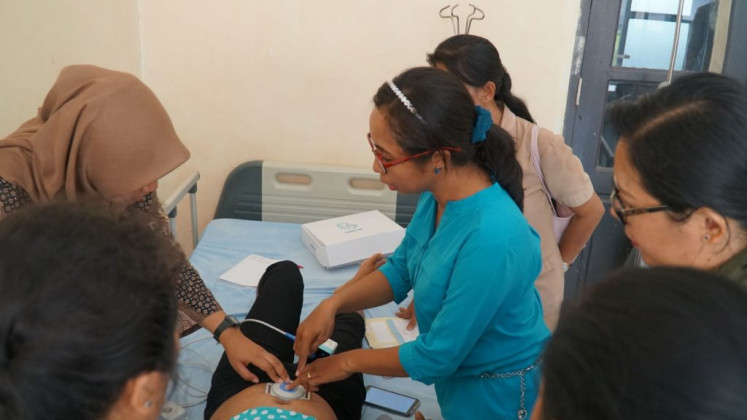Popular Reads
Top Results
Can't find what you're looking for?
View all search resultsPopular Reads
Top Results
Can't find what you're looking for?
View all search resultsIntroducing the new cybercrime treaty
Will the cybercrime convention be an epiphany for those who seek effective legal measures?
Change text size
Gift Premium Articles
to Anyone
This month, a key ASEAN country will be host to a raft of countries for the signing ceremony of the new cybercrime treaty.
Its full (and rather wordy) title is the “United Nations Convention against Cybercrime; Strengthening International Cooperation for Combating Certain Crimes Committed by Means of Information and Communications Technology Systems and for the Sharing of Evidence in Electronic Form of Serious Crimes”.
Will this “Cybercrime Convention” be an epiphany for those who seek effective legal measures against online scams and other heinous cyber-malware wreaking havoc worldwide?
There was a precursor to this new treaty in the form of the 2001 Convention on Cybercrime, or “Budapest Convention”, which evolved in Europe but was open to ratification by countries beyond Europe.
The convention was generally seen as balanced for a number of reasons. First, it provided a finite list of crimes to be outlawed, thus preventing arbitrary generalization of online crimes at the national level based on too much discretion for the authorities. And second, it was a treaty much linked with checks and balances premised on human rights and democracy.
Behind the drafting of the new treaty, those considerations were very much part and parcel of the contestation between democratic countries and nondemocratic countries. This convention provides a sense of balance to some extent, but it does not solve all the underlying problems.
On the positive side, the Cybercrime Convention provides a finite list of malpractices which need to be criminalized nationally, rather than a negative, generalized approach. The list is based on the following: illegal access to cyber-systems (such as computers); illegal interception of electronic data; interference with electronic data; interference with an information and communications technology system; misuse of such devices; related forgery; related theft or fraud; offenses concerning online child sexual abuse or exploitation; solicitation or grooming for the purpose of committing a sexual offense against a child; and nonconsensual dissemination of intimate images.
There are then provisions against money laundering and on the liability of legal persons, implying both individuals and companies. The jurisdiction for legal action at the national level under the convention is broad, covering not only when the offense is committed on the territory of a member country; it can also be extended to cover offenses committed by a national of the member country as well as misdeeds against a national of the member country or against the member country itself. There are procedural safeguards for investigations and prosecutions, as well as protection and assistance for victims and witnesses. Expedited preservation of data is provided for, while promoting international cooperation to counter cybercrimes.
There is flexibility on several fronts to enable universality of membership by a large number of countries. On the issue of child sexual abuse, a member country can exempt from criminalization those cyber-materials which are not based on a real child (for example, a pornographic manga cartoon not derived from an identified child). It can also exclude from criminalization the conduct by children for self-generated material depicting them.
The prohibitions against grooming and against nonconsensual dissemination of intimate images are new for an international treaty. A gender perspective is much needed, as women have often been the victims of such breach of privacy and harassment.
Interestingly, the new treaty does not delve into the sensitive area of misinformation and disinformation which are at times the result of state propaganda. This grey area needs capacity-building and educational measures to enable the public to “think before believing”, from a young age, in a democratized setting with a discerning mindset.
However, there are various stumbling blocks in relation to the Cybercrime Convention.
Many provisions in this treaty defer to domestic law in relation to the various prohibitions. Ironically, a government ’s claim against a cybercrime domestically may, in fact, be justifying an excuse to constrain the freedom of expression of individuals perceived to be antithetical to the regime in power.
National experience already indicates that it is easy for nondemocratic countries to prosecute political dissidents allegedly engaged in cybercrimes, such as forgery or fraud, even though they might be merely exercising the freedom to criticize in keeping with international law.
To be fair to the new treaty, there is an explicit provision advocating respect for human rights.
However, the relationship between rights-cum-freedoms and limits imposed in the name of criminalizing cybercrimes is not totally clear.
In international human rights law, for instance, limits on the right to freedom of expression are only permissible if they fulfill a three-part test. First, the government of the country trying to limit that right must prove that there is a clear law on the subject rather than a measure based on broad executive discretion – the principle of “legality”. Second, the authorities must prove that the limitation is necessary according to the risks and proportionate to the circumstances – the principles of “necessity” and “proportionality”. And third, the limitation needs to have legitimate aims, such as to protect democracy or to shield children from abuse – the principle of “legitimacy”.
There are other dangers which lurk. The new treaty opens the door to mutual legal assistance between member countries not only regarding cybercrimes but also in relation to “serious crimes” which are not necessarily cybercrimes.
The term “serious crimes” is defined by this treaty as “conduct constituting an offence punishable by a maximum deprivation of liberty of at least four years or a more serious penalty”. This could lead to more cross-border cooperation against political dissidents in the maelstrom area now known as “transnational repression”.
As a monitor of the implementation of the new treaty, a conference of states parties will take place periodically. While this will offer a check and balance against excesses by some countries to some extent, it is also incumbent on the international community, including UN human rights mechanisms, to keep watch on the situation.
The role of civil society and the business sector will also be important as vigilant sentinels to ensure that the criminalization of cybercrimes is not a pretext to confirm or reinforce the mass of criminal laws, policies and practices existing in many countries which are used against political dissidents and nongovernmental voices.
Beware of the shrinking space for individuals and communities in a world of increasing surveillance, artificial intelligence and dominance by the political elite.
---
The writer is a professor emeritus at Chulalongkorn University and has helped the United Nations as a UN Special Rapporteur, independent expert and member of the UN Commissions of Inquiry on Human Rights. The views expressed are personal.











